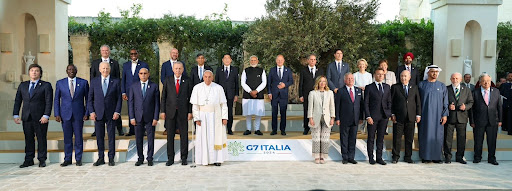The 2024 G7 Summit, hosted by Italy in the picturesque coastal town of Taormina, marked a pivotal moment in addressing some of the most pressing global challenges. Bringing together leaders from the world’s seven largest advanced economies—Canada, France, Germany, Italy, Japan, the UK, and the US—this year’s summit focused on discussions about climate change, economic instability, digital transformation, and geopolitical tensions.
Climate Change and Sustainability
A significant part of the summit was dedicated to combating climate change, reflecting the growing urgency to meet the Paris Agreement goals. The leaders reaffirmed their commitment to achieving net-zero carbon emissions by 2050. Emphasis was placed on transitioning to renewable energy sources, with significant investments in wind, solar, and hydrogen technologies. Italy showcased its advancements in green energy, particularly its ambitious plans for offshore wind farms in the Mediterranean.
The G7 also addressed the need for a just transition, ensuring that the shift to a green economy benefits all, including vulnerable populations and regions heavily reliant on fossil fuels. Financial mechanisms were discussed to support developing countries in their climate adaptation and mitigation efforts, highlighting a renewed spirit of global cooperation.
Economic Recovery and Stability
The global economy’s post-pandemic recovery remains uneven, with inflation, supply chain disruptions, and debt crises affecting various regions differently. The G7 leaders committed to enhancing economic resilience through coordinated policies aimed at stabilizing financial markets, supporting small and medium-sized businesses, and fostering innovation-driven growth.
A major outcome was the agreement to strengthen global tax cooperation to address tax evasion and ensure that multinational corporations pay their fair share. This initiative is expected to generate significant revenue that can be redirected towards social and infrastructure investments, boosting economic stability and growth.
Digital Transformation
Recognizing the transformative potential of digital technology, the G7 Summit placed a strong emphasis on fostering a secure, inclusive, and innovative digital economy. Discussions centered on setting international standards for artificial intelligence (AI) and data privacy, with a consensus on the need for ethical guidelines that balance technological advancement with individual rights.
The leaders also explored ways to bridge the digital divide, especially in education and healthcare. By investing in digital infrastructure and promoting digital literacy, the G7 aims to ensure that the benefits of the digital revolution are widely shared, fostering more inclusive societies.
Geopolitical Tensions and Global Security
In the realm of global security, the 2024 G7 Summit confronted various geopolitical challenges, including rising tensions in Eastern Europe and the Indo-Pacific region. The leaders underscored the importance of maintaining an international order based on the rule of law, with strong support for multilateral institutions like the United Nations and NATO.
A unified stance was taken against unilateral actions that threaten global stability, with a call for diplomatic solutions to ongoing conflicts. Additionally, the summit highlighted the need for enhanced cybersecurity measures to protect critical infrastructure and guard against state-backed cyber threats.
Humanitarian Efforts and Health
Humanitarian crises, exacerbated by conflict and climate change, were another focal point. The G7 pledged increased support for humanitarian aid, with a particular focus on addressing food insecurity and promoting global health initiatives. The lessons learned from the COVID-19 pandemic underscored the need for stronger global health systems and better preparedness for future pandemics.
Conclusion
The 2024 G7 Summit in Taormina underscored the importance of unity and cooperation in tackling global challenges. By reaffirming commitments to climate action, economic stability, digital innovation, global security, and humanitarian aid, the G7 leaders demonstrated a collective resolve to shape a more sustainable, prosperous, and secure future. As the world navigates an increasingly complex landscape, the outcomes of this summit will play a crucial role in guiding international policy and fostering global collaboration.
